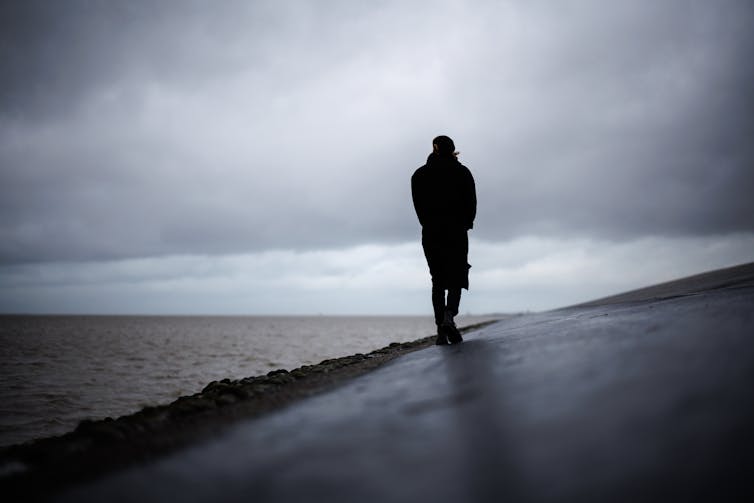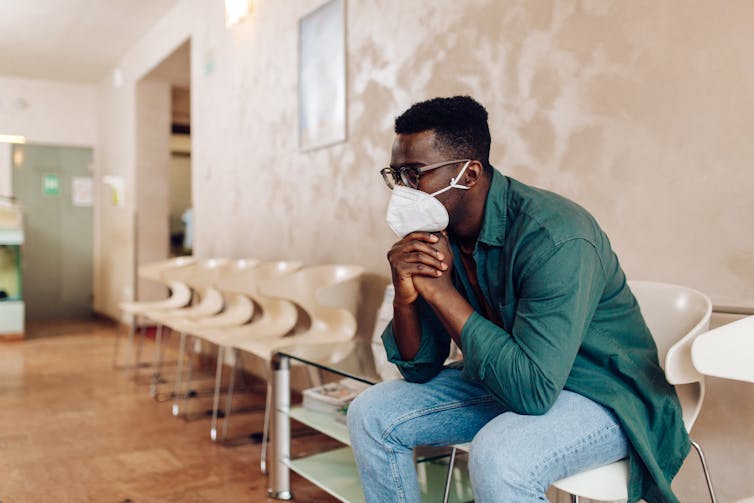
By Alvin Thomas and Quinn Kinzer
A few weeks before Justin Bieber and his wife, Hailey, announced in May 2024 that they were expecting, the pop icon posted a selfie where he appears tearful and distraught.
While media attention quickly pivoted to the pregnancy, there was little attention paid to the significance of a male celebrity and expectant father publicly sharing his vulnerability.
Yet Bieber’s social media post is notable for making his internal struggle visible.
Emotional pain is linked to serious health issues. But the public’s response to male expressions of emotion and vulnerability is often minimizing, if not dismissive. In response to Bieber’s tearful post, for example, Hailey described him as a “pretty crier.”
A year ago, the Canadian rapper Dax released the song “To Be a Man.” He said at the time: “This is a song I poured my heart into. I’m praying this reaches everyone who needs it.”
Today, the song’s message remains timely. It includes the lyrics:
Yeah, I know this life can really beat you down, uh
You wanna scream but you won’t make a sound, uh
Got so much weight that you’ve been holdin’
But won’t show any emotion, as a man, that goes unspoken
As researchers who study fatherhood and the roles that men play in their families, we recognize the loneliness and pain in these lyrics. We have heard fathers describe the toll of attempting to keep a lid on their feelings.
In a recent study we conducted on 75 new and expectant Black fathers, they spoke of the need to address individual and collective trauma. This, they said, would ultimately help support their families. But they said resources to help men with their mental health are often unavailable or very limited. They said they often feel invisible to health providers.
“Being a father and a man,” one participant said, “you have to keep the peace and be strong on the outside. But on the inside, you know, you’re falling apart.”
Dax’s lyrics and our research reflect an enduring social health challenge – the deafening silence that typically surrounds men’s mental health.
The toll of isolation on men
In May 2023, U.S. Surgeon General Dr. Vivek Murthy released an advisory highlighting what he described as an epidemic of loneliness and isolation in the country. Our research confirms this scourge.
Since men’s social support networks – colleagues, family, close childhood friends – are often less robust than women’s, the epidemic disproportionately impacts men. The resulting solitude has very real health consequences.

Matthias Balk/picture alliance via Getty Images
In Murthy’s report, loneliness is associated with negative health outcomes, including a “29% increased risk of heart disease, a 32% increased risk of stroke, and a 50% increased risk of developing dementia for older adults. Additionally, lacking social connection increases risk of premature death by more than 60%.”
While Murthy’s report focuses on both men and women, research shows that men are less likely than women to seek mental health services. Additionally, men hold more negative attitudes toward seeking help, and they prematurely terminate treatment more often than women.
With these consequences in mind, a caring society may ask: Why are men carrying the brunt of this health risk, and what can be done about it?
Redefining men’s value beyond breadwinning
Many factors can contribute to feelings of isolation and disconnection among men.
In “To Be A Man,” Dax points toward one prominent factor:
As a man, we gotta pave our way
Our only function is to work and slave
There’s no respect for you if you ain’t paid
You’re disregarded as a human and you can’t complain
Traditional definitions of masculinity emphasize the importance of men’s role as breadwinners.
An uncertain economy and increasingly expensive housing and food prices make the ability to financially provide for a family elusive for many men. These factors also undermine men’s sense of self and contribute to loneliness and feelings of isolation.
As partners and fathers, men are still often perceived as deficient if they can’t provide economically. And societal norms stress that they are not valued for their capacity as caregivers, even if they are more involved in raising their children than ever before.
This is out of touch with reality.
Men play an important role as caregivers in their children’s lives, according to our research, and exert a powerful influence on children’s health and well-being. Men also find meaning in their roles as fathers.
As Dax says:
As a man, our son is our horizon
The cost of suppressed vulnerability
Beyond pressures to provide, men also have to overcome enduring stereotypes that suggest they should be stoic and keep their fears and sadness to themselves.
Here, too, gender norms are in need of an update. Boys and men need to feel comfortable presenting their true, authentic selves to the world. When they suppress their vulnerability, it creates a barrier to seeking help. It also perpetuates stigma and the epidemic of loneliness.

Getty Images
There is a complex interplay between society’s assumptions and beliefs about men and fatherhood.
Men, consequently, are less likely than women to seek mental health services. Health providers, as a result, are more likely to underdiagnose and misdiagnose men. Additionally, when health resources are made available, they are often not tailored to men’s needs.
Societal expectations can create unbearable pressure for men. And the most marginalized groups, like low-income Black fathers, bear a disproportionate burden, research shows. This became more evident during the COVID-19 pandemic, when Black fathers working in high-risk and essential jobs prioritized supporting their children and families over their own risk of infection and mental health.
As men continue to redefine their roles within families and communities, it’s important for society to create a space that acknowledges and embraces their vulnerabilities and full humanity in all social roles.
Men need outlets for their pain. They would benefit from relationships – with partners, family and friends – that support and nurture them in times of joy and through the emotional challenges. Their loneliness will continue to be disproportionate without the necessary connection to services.
Men can consider engaging in low-stakes discussion groups in their communities, with online groups and in their churches. They may also seek out therapists in person or online for introductory sessions to test out the therapeutic interaction before establishing a more consistent pattern of therapy services.
In “To Be a Man,” Dax sings:
No wonder most men are so depressed
All the things that they can’t express
It’s the circle of life, as a man, you provide
They don’t know what you’re worth ‘til the day that you die
As the Biebers adjust to life as parents, Justin may find people he can talk to about his experiences and emotions, people who see and value him fully. And we hope the same for every man and father, living their life out of the spotlight and doing the best they can for themselves and for their family.
![]()
Alvin Thomas is Associate Professor and Phyllis Northway Faculty Fellow at the University of Wisconsin-Madison. Quinn Kinzer is a doctoral candidate in the Department of Consumer Science at the University of Wisconsin-Madison.





























JimboXYZ says
Watch enough YouTube videos, women aren’t any happier really because men aren’t chasing the dating => marriage thing. End of the day, find it in yourself to find your own happiness. some of those YouTube things are depressingly comical, covering topics like body counts, 304’s, delusional overvaluation of what either gender brings to the table walking into a relationship, the potential risks of a life of ruination thru divorce, baby daddies, gold diggers, OF girls & everything else that has evolved thru social agendas. The old school system of traditional roles vs the new order in relationships & dating/mating rituals. I have no solution for it, where it was, what it became for how it’s evolved, but here we are 60 years of it. The human race will need to find a way to muddle thru it like they always have ?
Skibum says
It is perfectly okay for men to show emotion, to cry, and to reach out for help, emotional support, or just to bare their feelings and talk or vent when necessary. Despite all of the fake masculinity we have been taught since we were young, men are no more masculine by hiding their feelings and being an emotional wreck than they are breaking down in tears and showing true humanity when the situation dictates.
Laurel says
My husband, I have no doubt, was a silver-back gorilla in a previous life. He is formidable, kind, gentle, family oriented and people oriented. A silver-back is peaceful, but if one should stand up, you pay attention. My husband is confident and has no fear of rejection. People frequently start telling him their life stories, even on introduction, as he exudes a trustfulness. He does not fear emotion. God, I love him! He is a perfect example of how, in my opinion, a man should be. He, not I, is the one who tears up at weddings! He was the only man in my Zumba class, and the women loved it, even if his rhythm was a tad off!
It is incredibly sad, and wrong, that we, as a society, seem to think a man should be emotionless. That he should be some sort of cold machine, or a bully. That strength lies only in muscle, or fear mongering. Now, who do we have to look up to? What are society’s image of a man? Who are our examples? Should he be a rich, white, straight, bossy, mean, ultra macho guy, or should he be what nature made him to be: a balanced human being. I’ll take nature.
Please, men, be who your gut tells you to be, not what merchandising, selfish, frightened bullies tell you to be. Seek out advise and help, it’s okay! Do not continue to be miserable and lonely in order to “fit in.” Raise your boys to be strong to stand up to conformity. Nature gave all of us the ability to cry for a reason. Nature gave us all emotion for a reason. Strength lies in confidence, not fear of what others may think.
Skibum says
Well stated, Laurel. And dare I say it… men who exhibit emotion and aren’t afraid to show compassion and empathy undoubtably treat women much better too. It isn’t lost on my that the epitome of someone who is completely unable or unwilling to show any emotion, except rage, is Donald Trump. And we all know his long, disgusting history of mistreatment of the opposite sex. Women, if you are reading Laurel’s description of her husband, find a man like that and you will most likely be very happy, and in very good hands. Congratulations, Laurel, you found a diamond!
Laurel says
Skibum: Thank you! It’s one thing I did right, and took my time, too! The only other person I wanted to marry was Paul McCartney, but he was taken, and I was Thirteen.
Yes, he is very supportive and he actually exceeded my expectations. He takes good care of me (and I ain’t easy).
Sherry says
Hi Laurel,
You hubby sounds wonderful! Thank goodness, mine is much the same, and is beloved by all who know him.
When I think about some of the angry men who post here regularly. . . they are clearly “broken” and lashing out in negative ways. Counseling would most certainly help, but unfortunately they would not be likely to seek it. So glad my instincts kept me away from even dating anyone filled with such insecurity.
E.Brook says
Please, if any young men are reading this – make friends and make the effort to keep them. The young women I know go to lunches or even trips with their girlfriends/sisters, but I see no such activities among young fathers. Men may be adequately fulfilled by having a family, until they’re not. So here’s my generalization: when your kids are gone (which will be very, very soon), you will find yourself with only your spouse, and no matter how much she loves you, she will have friends and activities that do not include you. Furthermore, she will relish being alone sometimes – as Keb Mo says, “how can you miss me if I don’t go away?” As a retired woman, I hear from my contemporaries their concern about husbands who have no social life that isn’t organized and maintained by their wives. I’m not qualified to say why this is so, just that it’s sad. Women talk to friends because there is comfort in hearing that others have their same worries, frustrations, fears. So men, keep friends that you can talk to, and make a life for yourself. One that includes your wife, but isn’t hung completely on her shoulders. Meet a friend at the pool hall, or the beach bar, or art class, or a high school football game, or a political meeting, or choir practice. It’s good for you.
Sherry says
Great advice E. Brook! Hopefully some fellows will heed it.